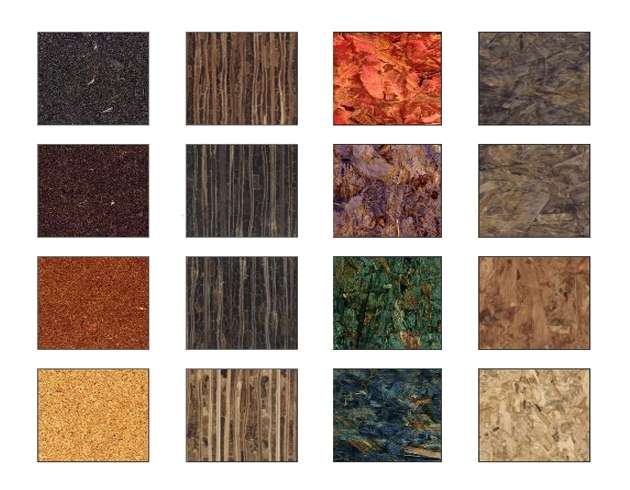Worried you’ll be stuck with a plain Jane home or office if you want a sustainable environment? Think again! The green building industry has come a long way: you can now find materials that are eco-conscious and drop dead gorgeous. In fact environmentally friendly products can come in a riot of colors, textures and even natural fragrances to tickle your senses. Some manufacturing processes are so sophisticated that it’s almost impossible to discern the products’ humble origins.
In addition to my earlier collection of snazzy and green products, here’s a wealth of materials used in construction and furnishings that are both eco-friendly and beautiful. Do let me know your favs!

Finish designer Ritva Puotila has created a flooring line spun from the lowly kraft paper. Her paper is ecologically produced, recyclable and rapidly renewable. A bonus for those who suffer from allergies – the yarn fibers are purportedly so dense that the resulting rug collects neither dust nor dirt!

The corrugation creates a wavy look that gives the Corelam product a spare mid-century aesthetic. Thanks to its unusual construction, the material is strong but lightweight and can be used for wall or ceiling panels, as well as doors and furniture. The veneers are FSC certified and the sheets are produced with adhesives that contain no VOCs.

I love the dimensional look of these paper tiles by Slate-ish. The tiles are made with scraps left over from counter top fabrications. Though paper-based, the material is 6X stronger than stone, impact resistant and water proof. They are offered in a wide range of sizes and vary from 1/16″ to ¼” in thickness. Available in 5 colors, the tiles can be left unsealed or sealed.

What to do with out of favor porcelain? It was not too long ago that bidets have been touted as the epitome of bathroom civility. Now the vicissitudes of fashion is relegating them to the landfill. To the rescue comes Fireclay Tile! The eco-conscious company expanded its use of reclaimed waste and is now offering tiles with 70% recycled content, 50% of which is post-consumer recycled material.

Organoids is an innovative green manufacturer that creates wood-based panels from all natural sources. In this case real leave skeletons were meticulously created and applied by hand so the resulting boards are redolent of vanilla with hints of nutmeg and cinnamon. Yummy!

Although the company website dispels any thoughts of its decorative coatings being edible, it uses an amazing assortment of food sources, from fruit teas to orange slices. Someone must have been hungry when creating the product line! In addition to the smorgasbord of colors and textures, Organoids offers naturally scented decorative panels with rose petals, lavender or spruce chips to create a unique sensory experience.

Aluminum requires an extremely energy intensive manufacturing process and unfortunately airplanes use lots of it. To keep the tons of scrap metal from the landfill, CoveringsEtc offers Bio-Luminum, a line of tiles made from 100% recycled aircraft aluminum. The product is extremely durable and suitable for vertical or horizontal applications. It’s certified Cradle to Cradle and can be recycled again at end of life.

For those who appreciate the natural beauty and luster of wood, Trove offers a series of cloth or paper-backed veneer wallcoverings from FSC-certified maple, oak, cherry, walnut, birch, and bamboo. The collection features an understated color scheme so attention can be focused on the play of light and texture between the wood and printed design.


While Dutch designer Greetje van Tiem doesn’t exactly have the Midas touch, she is able to turn old newspapers into yarns. At 20 yds of yarn per sheet, it’s more an artisanal endeavor than mass merchandising, but at least there’s no shortage of raw material! The yarn can be woven, knitted or knotted by hand to create shawls, upholstery, draperies or flooring. Though not washable, it’s still sturdy and durable enough to work as floor mats.

Inspired by the durability of terrazzo flooring, Dutch designer Dave Hakkens created his own Rubble Floor using 70-80% salvaged building trash such as tiles, glass, bricks and scrap metal. Pigments from the ground up bricks and roof tiles give the flooring a classical palette.

TorZo offers an expanding line of eco-conscious but stylish composite boards made from agricultural byproducts and recycled materials. Created from fabric scraps, the Denim board is infused with acrylic resin and mounted onto plywood so it can be used on walls or floors. The surface of the board can be either left natural to showcase the texture of the fabrics or filled and sanded when a smooth, flat face is required.

If you want a ‘green’ surfacing material but find the color palette often limiting, TorZo offers a variety of products in jewel toned finishes and unique textures. The striking Orient is made from SFI certified recycled wood chips and comes in 4 premium, 4 standard colors as shown. Similar vibrant colors are available in other product lines.


